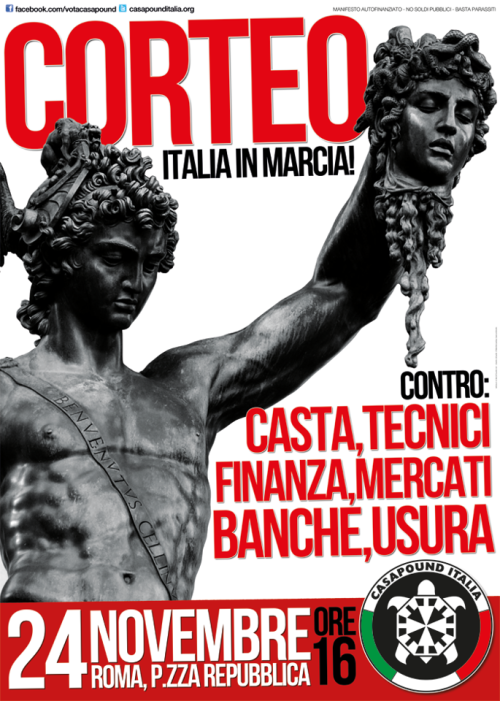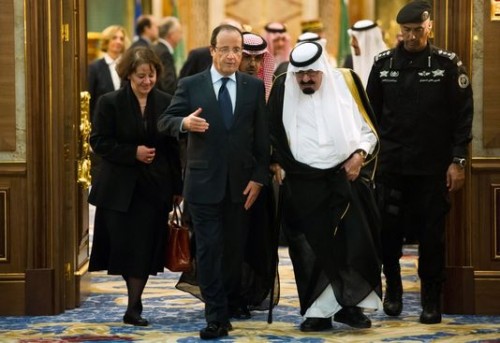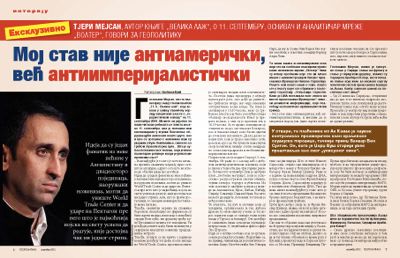
Thierry Meyssan beantwortet Fragen der serbischen Zeitschrift Geopolitika. Er kommt zurück auf seine Interpretation der Ereignisse vom 11. September, auf die Ereignisse von Syrien und die aktuelle Lage in Serbien.
Voltaire Netzwerk | Belgrad (Serbien) | 7. Dezember 2012
Geopolitika : Herr Meyssan, Sie haben Weltruhm erworben, als Sie das Buch L’Effroyable imposture veröffentlichten, das die offizielle Version von den amerikanischen Behörden über den Terroranschlag vom 11. September 2001 in Frage stellte. Ihr Buch ermutigte andere Intellektuelle ihre Zweifel über dieses tragische Ereignis zum Ausdruck zu bringen. Könnten Sie unseren Lesern kurz sagen, was tatsächlich an diesem 11. September passiert ist, was im Gebäude des Pentagons einschlug oder explodierte: war es ein Flugzeug oder etwas anderes? Was passierte mit den Flugzeugen, die in den Zwillingstürmen einschlugen, vor allem was mit dem dritten Gebäude neben diesen Türmen geschah? Was ist der tiefere Zusammenhang dieses Angriffs, der globale Auswirkungen hatte, und die Welt verändert hat?
Thierry Meyssan:Es ist erstaunlich, dass die Weltpresse die offizielle Version weitergeleitet hat, einerseits weil sie absurd ist, andererseits weil sie nicht in der Lage ist, manche der Ereignisse zu erklären.
Die Idee, dass ein in einer Höhle in Afghanistan hausender Fanatiker und etwa zwanzig mit Teppichmessern ausgestatteten Personen das World Trade Center zerstören und in das Pentagon einschlagen hätten können, bevor die weltweit mächtigste Armee Zeit hätte zu reagieren, ist nicht einmal eines Trickfilms würdig. Aber je grotesker die Geschichte, desto weniger stellen die westlichen Journalisten Fragen.
Andererseits spiegelt die offizielle Version weder die Börsenspekulation auf die betroffenen Unternehmen wieder, die Opfer dieser Angriffe wurden, noch das Feuer des Anhangs des Weißen Hauses, noch den Zusammenbruch des dritten Turms des World Trade Center am Nachmittag. So viele Ereignisse, die im Abschlussbericht der Präsidenten Kommission nicht einmal erwähnt werden.
Grundsätzlich spricht man nie von dem einzig Wichtigen dieses Tages: nach dem Anschlag auf das World Trade Center wurde der Regierungsplan der Kontinuität (COG) gesetzeswidrig aktiviert. Es gibt ein Verfahren im Falle eines nuklearen Krieges. Falls man die Vernichtung der zivilen Behörden konstatiert, übernimmt eine alternative Militärregierung das Ruder. Um 10h30 wurde dieser Plan aktiviert, obwohl die zivilen Behörden noch immer in Kapazität waren, ihre Verantwortung auszuüben. Die Macht kam in die Hände des Militärs, das sie erst um 16 h30 den Zivilisten zurückgab. Während dieser Zeit gingen Kommandos fast alle Mitglieder des Kongresses und Mitglieder der Regierung einholen, um sie zur Gewährleistung der Sicherheit in Antiatom-Notunterkünften unterzubringen. Es gab daher einen Militärputsch von ein paar Stunden, nur für eine Zeitspanne, die die Putschisten benötigten, um ihre politische Linie aufzuerlegen: Notfalls Zustand im Inland und globalen Imperialismus im Ausland.
Am 13. September wurde der Patriot Act im Senat vorgelegt. Dies ist kein Gesetz, sondern ein dicker Anti-Terror-Code, dessen Verfassung in den vergangenen zwei bis drei Jahren im geheimen durchgeführt wurde. Am 15. September billigte Präsident Bush den Plan der Welt-”Matrix” zur Schaffung eines umfassenden Systems von Entführung, geheimen Gefängnissen, Folter und Mord. In dieser selben Sitzung billigte er einen Plan für die aufeinanderfolgenden Angriffe auf Afghanistan, Irak, Libanon, Libyen, Syrien, Somalia, Sudan und auf den Iran. Sie können sehen, dass die Hälfte des Programms bereits erledigt ist.
Diese Attentate, dieser Staatsstreich und die folgenden Verbrechen, wurden durch den tiefen Staat (in dem Sinne, in dem dieser Begriff verwendet wird, um die geheime militärische Macht in der Türkei und Algerien zu beschreiben) organisiert. Diese Ereignisse wurden von einer sehr geschlossenen Gruppe entworfen: die Straussianer, d. h. die Anhänger des Philosophen Leo Strauss.
Dies sind die gleichen Personen, die den US-Kongress 1995 ermutigt hatten, aufzurüsten und die die Zerstückelung Jugoslawiens organisiert haben. Wir müssen zum Beispiel daran erinnern, dass Alija Izetbegovic Richard Perle zum politischen Berater hatte, Osama Bin Laden zum Militärberater und Bernard-Henri Lévy zum Berater der Medien hatte.
Geopolitika: Ihr Buch und Ihre anti-amerikanische Haltung, die Sie in Ihrem unabhängigen Netzwerk Voltaire frei geäußert haben, wurden Quelle von Problemen, die Sie persönlich mit der Verwaltung des ehemaligen französischen Präsidenten Nicolas Sarkozy hatten. Könnten Sie uns darüber ein bisschen mehr sagen? In der Tat hatten Sie in dem Artikel über Herrn Sarkozy, mit dem Titel: „Die Operation Sarkozy: Wie die CIA einen ihrer Agenten zum Präsidenten der Republik Frankreichs machte“, vertrauliche Informationen geschrieben, die an einen politisch-kriminellen Thriller erinnern.
Thierry Meyssan:Ich bin nicht antiamerikanisch. Ich bin Anti-imperialist und denke, dass die Menschen in den Vereinigten Staaten auch Opfer der Politik ihrer Führer sind.
Was Nicolas Sarkozy betrifft zeigte ich, dass er während seiner Jugend in New York von Botschafter Frank Wisner Jr. erzogen wurde. Diese Person ist einer der wichtigsten Offiziere der CIA, die von seinem Vater Frank Wisner Sr. gegründet wurde. Die Karriere von Nicolas Sarkozy war daher völlig von der CIA geprägt. Es war daher nicht verwunderlich, dass er als Präsident der französischen Republik Washingtons Interessen und nicht die von den Franzosen verteidigt hatte.
Die Serben kennen Frank Wisner Jr. gut: Er war es, der die einseitige Unabhängigkeit des Kosovo als Sonder-Vertreter des Präsidenten der Vereinigten Staaten organisiert hat.
Ich erklärte all dies im Detail während einer Intervention im Eurasian Media Forum (Kasachstan) und man bat mich, es in einem Artikel für Odnako (Russland) zu entwickeln. Durch einen zeitlichen Zufall wurde er während des Georgien-Krieges veröffentlicht, genau in dem Moment, als Sarkozy nach Moskau kam. Ministerpräsident Vladimir Putin hat das Magazin auf den Tisch gelegt, bevor er begann, mit ihm zu diskutieren. Dies hat natürlich mein Verhältnis mit Sarkozy nicht verbessert.
Geopolitika: Herr Meyssan, wie ist die aktuelle Situation in Syrien, die Situation an der Front und die Situation in der syrischen Gesellschaft? Sind Katar und Saudi-Arabien, sowie die westlichen Länder, die das politische System des Präsidenten Bachar El Assad stürzen wollen, sind sie nah an der Vollendung ihres Ziels?
Thierry Meyssan:Von 23 Millionen Syrern unterstützen etwa 2 bis 2,5 Millionen die bewaffneten Gruppen, die versuchen, das Land zu destabilisieren und seine Armee zu schwächen. Sie haben die Kontrolle über ein paar Städte und große ländliche Gebiete übernommen. In keinem Fall sind diese bewaffneten Gruppen in der Lage, das Regime zu stürzen.
Der westliche ursprüngliche Plan hat vorgesehen, dass terroristische Aktionen einen Zyklus von Provokation und Strafverfolgung schaffen würden, was internationale Intervention rechtfertigen sollte, nach dem Vorbild des UCK-Terrorismus und der Unterdrückung von Slobodan Milosevic, gefolgt von der NATO-Intervention. Beachten Sie im Vorbeigehen, dass es bescheinigt ist, dass militante Gruppen in Syrien von Mitgliedern der UCK auf dem Territorium des Kosovo für Terrorismus geschult wurden.
Dieser Plan scheiterte, weil Wladimir Putins Russland nicht das von Boris Jeltsin ist. Moskau und Peking haben der NATO das Eingreifen verboten und seitdem verfault die Situation.
Geopolitika: Was wollen die Vereinigten Staaten, Frankreich, Großbritannien, Saudi-Arabien und der Katar durch den Sturz des Präsidenten Al-Assad erreichen?
Thierry Meyssan:Jedes Mitglied der Koalition hat sein eigenes Interesse an diesem Krieg und glaubt, es erreichen zu können, obwohl diese Interessen manchmal mit einander in Konflikt stehen.
Auf politischer Ebene besteht der Wille, die “Achse des Widerstandes gegen den Zionismus” (Iran-Irak-Syrien-Hisbollah-Palästina) zu brechen. Es gibt auch weiterhin den Willen zum „Umbau des Nahen und mittleren Osten“.
Aber das wichtigste ist das wirtschaftliche Interesse: riesige Reserven von Erdgas wurden im Osten des Mittelmeeres entdeckt. Das Zentrum der Lagerstätte ist in der Nähe von Homs in Syrien (genauer gesagt in Qârâ).
Geopolitika: Könnten Sie uns etwas mehr über den Al-Kaida Aufstand in Syrien sagen, deren Beziehungen zu den Vereinigten Staaten nicht wenig widersprüchlich sind, wenn man sich ihre Aktionen auf dem Boden anschaut? Sie sagten in einem Interview, dass die Beziehungen zwischen der NATO und Abdelhakim Belhadj fast institutionalisiert seien. Für wen führt Al-Kaida eigentlich Krieg?
Thierry Meyssan:Al-Kaida war ursprünglich nur der Name der Datenbank, der Computerdatei, der nach Afghanistan entsandten arabischen Mujaheddin, um gegen die Sowjets zu kämpfen. Durch eine Erweiterung hieß man Al-Qaida die Dschihad-Welt, in der Söldner angeworben wurden. Dann nannte man Al-Qaida die Veteranen von Bin Laden und durch noch eine Erweiterung, alle Gruppen in der Welt, die der Bin Laden-Ideologie angehören.
Je nach den Anforderungen und der Perioden war diese Bewegung mehr oder weniger bedeutend. Während des ersten Krieges in Afghanistan, des Krieges in Bosnien und Tschetschenien, waren diese Söldner “Freiheitskämpfer”, weil sie gegen die Slawen kämpften. Dann, während des zweiten Afghanistan Krieges und der Irak-Invasion, waren sie “Terroristen”, weil sie gegen die GI’s kämpften. Nach dem offiziellen Tod von Bin Laden sind sie wieder “Freiheitskämpfer” geworden, während der Kriege von Libyen und Syrien, weil sie neben der NATO kämpfen.
In Wirklichkeit wurden diese Söldner immer von dem Clan der Sudeiris kontrolliert, einer pro-amerikanischen und ur-reaktionären Fraktion der saudischen Königsfamilie und speziell von Prinz Bandar Bin Sultan. Dieser, den George Bush Vater immer als ” seinen Adoptivsohn” (d.h. der intelligente Junge, den der Vater sich gewünscht hatte) präsentierte, hat niemals aufgehört, im Auftrag der CIA zu handeln. Auch als Al-Kaida die GI’s in Afghanistan und im Irak bekämpfte, geschah es immer noch im besten Interesse der Vereinigten Staaten, weil dies ihre militärische Präsenz rechtfertigte.
Es kam erst in den letzten Jahren, dass die Libyer innerhalb der Al-Kaida die Mehrheit bildeten. Die NATO benutzte sie daher natürlich zum Sturz des Regimes von Muammar el-Gaddafi. Sobald dies erledigt war, ernannte man die Nummer 2 der Organisation, Abdelhakim Belhaj, zum militärischen Gouverneur von Tripolis, obwohl er für seine Rolle in den Bombenanschlägen in Madrid von der spanischen Justiz gesucht wird. Anschließend haben sie ihn mit seinen Männern nach Syrien verlegt um dort zu kämpfen. Für ihren Transport verwendete die CIA die Ressourcen des Hohen Kommissars für Flüchtlinge dank Ian Martin, dem Sonderbeauftragten von Ban Ki-Moon in Libyen. Die angeblichen Flüchtlinge wurden in der Türkei in Lagern untergebracht, die ihnen als hintere Basis dienten, um Syrien anzugreifen und deren Zugang den türkischen Parlamentariern und der Presse verboten wurde.
Ian Martin ist auch Ihren Lesern bekannt: Er war Generalsekretär von Amnesty International, dann Vertreter des Hohen Kommissars für Menschenrechte von Bosnien und Herzegowina.
Geopolitika: Syrien ist nicht nur Ort eines Bürgerkrieges, sondern auch eines Medienkrieges und von Manipulationen. Wir bitten Sie als Zeuge, jemanden, der an Ort und Stelle weilt, uns zu sagen, was sich wirklich in Homs und Hula abgespielt hat.
Thierry Meyssan:Ich bin kein direkter Zeuge von dem, was in Hula geschah. Aber ich war eine Vertrauensperson in den Verhandlungen zwischen den syrischen und französischen Behörden während der Belagerung von dem islamischen Emirat Baba Amr. Die Dschihadisten hatten sich in diesem Stadtviertel von Homs verschanzt, von dem sie die Ungläubigen (Christen) und Ketzer (Schiiten) verjagt hatten. In der Tat blieben nur etwa 40 sunnitische Familien vor Ort, in der Mitte von 3000 Kämpfern. Diese Leute hatten die Scharia verhängt und ein “Revolutionstribunal” verurteilte mehr als 150 Personen zum Tode, indem sie ihnen die Kehle öffentlich durchschnitten.
Dieses selbsternannte Emirat wurde von französischen Offizieren heimlich geleitet. Die syrischen Behörden wollten den Sturm vermeiden und haben mit den französischen Behörden ausgehandelt, damit die Aufständischen sich ergaben. Schließlich konnten die Franzosen die Stadt bei Nacht verlassen und in den Libanon fliehen, während die loyalen Kräfte in das Emirat eindringen und die Kämpfer sich ergeben. Das Blutvergießen wurde so vermieden und es gab letztlich weniger als 50 Tote während der Operation.
Geopolitika: Neben den Alawiten sind auch die Christen Ziel in Syrien. Könnten Sie uns ein wenig mehr über die Verfolgung von Christen in diesem Land sagen und warum die so genannte westliche Zivilisation, deren Wurzeln christlich sind, keine Solidarität mit ihren Glaubensgenossen zeigt?
Thierry Meyssan:Die Dschihadisten vergehen sich vorrangig an jenen, die ihnen am nächsten stehen: zuerst an den progressiven Sunniten, dann an den Schiiten (einschließlich der Alawiten) und erst dann an den Christen. In der Regel foltern und töten sie kaum Christen. Jedoch vertreiben sie sie systematisch und stehlen ihr ganzes Eigentum. In der Nähe der nördlichen Grenze des Libanon gab die syrische freie Armee den Christen eine Woche, um zu fliehen. Es gab einen plötzlichen Exodus von 80000 Menschen. Wer nicht rechtzeitig geflohen war, wurde massakriert.
Das Christentum wurde vom Heiligen Paulus in Damaskus gegründet. Die syrischen Gemeinden sind älter als die des Westens. Sie haben die alten Rituale und einen sehr starken Glauben bewahrt. Die meisten sind orthodox. Diejenigen, die sich Rom angeschlossen haben, behielten ihre angestammten Riten bei. Während der Kreuzzüge kämpften die Christen des Orients mit den anderen Arabern gegen die vom Papst geschickten alten Haudegen. Heute kämpfen sie mit ihren Mitbürgern gegen die durch die NATO geschickten Dschihadisten.
Geopolitika: Kann man nächstes Jahr einen Angriff auf den Iran erwarten, und im Falle einer militärischen Intervention, was wäre die Rolle Israels? Ist der Angriff auf kerntechnische Anlagen das wahre Ziel von Tel-Aviv oder besteht er darin, dass Israel durch globale Strukturen, im Interesse einer breiten Destabilisierung der internationalen Beziehungen zu diesem Abenteuer hin gedrängt wird?
Thierry Meyssan:Es trifft sich, dass der Iran Träger einer Revolution ist. Heute ist er das einzige größere Land, das dem American Way of Life ein alternatives Modell der sozialen Organisation bietet. Die Iraner sind mystisch und ausdauernd. Sie lehrten die Araber die Kunst des Widerstands und widerstehen den Zionismus Projekten, nicht nur in der Region, sondern in der ganzen Welt.
Abgesehen davon, trotz seiner Aufschneiderei, kann Israel den Iran wirklich nicht angreifen. Und die Vereinigten Staaten selbst haben verzichtet ihn anzugreifen. Iran ist ein Land von 75 Millionen Einwohnern, wo jeder bereit ist, für sein Land zu sterben. Während die israelische Armee aus Jugendlichen besteht, deren militärische Erfahrung sich auf rassistische Ausschreitungen gegen die Palästinenser begrenzt und die US-Armee sich aus Arbeitslosen zusammensetzt, die nicht gewillt sind, für einen miserablen Söldnerlohn zu krepieren.
Geopolitika: Wie sehen Sie die Rolle Russlands im syrischen Konflikt und wie sehen Sie die Rolle des Präsidenten der Russischen Föderation, Wladimir Putin, der von der westlichen Presse stark verteufelt wird?
Thierry Meyssan:Die Verteufelung des Präsidenten Poutine durch die westliche Presse ist des Lasters Anerkennung der Tugend. Nachdem er sein Land wieder in Ordnung gebracht hatte, will Wladimir Putin ihm seinen gebührenden Platz in den internationalen Beziehungen zurückgeben. Er basierte seine Strategie auf die Kontrolle des, was die Hauptquelle der Energie im 21. Jahrhundert sein wird: das Gas. Gazprom wurde bereits das erste Gasunternehmen der Welt und Rosneft das erste Ölunternehmen. Er hat offensichtlich nicht die Absicht, die USA das syrische Gas an sich reißen zu lassen, noch auch den Iran sein eigenes Gas ohne Kontrolle ausbeuten zu lassen. Infolgedessen musste er in Syrien eingreifen und mit Iran ein Bündnis schließen.
Darüber hinaus wird Russland der wichtigste Garant für Völkerrecht, während die Westler im Namen einer Müll-Moral die Souveränität der Nationen verletzen. Man sollte die russische Macht nicht fürchten, weil sie dem Gesetz und dem Frieden dient.
Im Juni hat Sergej Lawrow in Genf einen Friedensplan ausgehandelt. Er wurde einseitig von den Vereinigten Staaten vertagt, aber sollte letztlich von Barack Obama während seiner zweiten Amtszeit umgesetzt werden. Er sieht die Bereitstellung von einer Kraft von UN-Friedenstruppen vor, hauptsächlich aus Truppen des KSVO bestehend. Darüber hinaus gesteht er die Beibehaltung von Baschar Al-Assad an der Macht zu, wenn das syrische Volk durch die Wahlurne so entscheidet.
Geopolitika: Was denken Sie über die Situation in Serbien und den schwierigen, von Serbien in den letzten zwei Jahrzehnten durchlaufenen Weg?
Thierry Meyssan:Serbien wurde durch die Reihe von Kriegen erschöpft, mit denen es konfrontiert war, vor allem dem der Eroberung des Kosovo durch die NATO. Es handelt sich tatsächlich um einen Eroberungskrieg, weil er mit der Amputation des Landes und der einseitigen Anerkennung durch die NATO-länder der Unabhängigkeit des Camp Bondsteel, d. h. des NATO-Stützpunkts endet.
Eine Mehrheit von Serben glaubte, sich der Europäischen Union nähern zu müssen. Dies verkennt die Tatsache, dass die Europäische Union die zivile Seite eines einzigartigen Stückes ist, dessen militärische Kehrseite die NATO ist. Historisch wurde die Europäische Union gemäß den geheimen Klauseln des Marshall-Plans geschaffen, sie war daher der NATO vorangegangenen, aber sie ist nicht weniger ein Teil desselben Projekts angelsächsischer Herrschaft.
Es kann sein, dass die Krise des Euro zu einem Zerfall der Europäischen Union führt. Staaten wie Griechenland und Serbien werden sich in diesem Fall spontan an Russland wenden, mit dem sie viele kulturelle Elemente und die gleiche Basis der Gerechtigkeit teilen. Geopolitika: Es wird Serbien mehr oder weniger direkt vorgeschlagen, den Kosovo aufzugeben, um in die Europäische Union gelangen zu können. Sie verfügen über umfangreiche Erfahrung auf internationalen Beziehungen und wir bitten Sie daher aufrichtig, ob Sie uns Ratschläge geben können, was Serben hinsichtlich der In- und ausländischen Politik machen sollte.
Thierry Meyssan:Es steht mir nicht zu, jemandem Rat zu geben. Ich persönlich bedauere nur, dass manche Staaten die Eroberung des Kosovo durch die NATO anerkannt haben. Seitdem wurde der Kosovo vor allem die Drehscheibe für Drogenhandel in Europa, Drogen, die unter dem wachsamen Schutz der US-Truppen in Afghanistan angebaut wurden. Kein Volk hat an dieser Unabhängigkeit im Geringsten profitiert, und schon gar nicht die Kosovaren, die jetzt von einer Mafia versklavt werden.
Geopolitika: Es gab zwischen Frankreich und Serbien eine starke Allianz, die ihre Bedeutung verlor, als Frankreich sich an der Bombardierung von Serbien im Rahmen der NATO 1999 beteiligte. Jedoch gibt es in Frankreich und Serbien immer noch Leute, die die “Freundschaft durch die Waffen” des ersten Weltkriegs nicht vergessen, und die meinen, dass man diesen kulturellen gebrochenen Beziehungen wieder neues Leben einhauchen sollte. Teilen Sie diese Ansicht?
Thierry Meyssan:Sie wissen, dass einer meiner Freunde, mit dem ich Le Pentagate schrieb, – über den Anschlag auf das Pentagon am 11. September mit einer Rakete und nicht mit einem virtuellen Flugzeug -, Oberst Pierre-Henri Bunel ist. Er wurde während des Krieges, wegen Spionage zu Gunsten von Serbien, durch die NATO verhaftet. Später wurde er an Frankreich zurückgegeben, das ihn vor Gericht stellte und zu zwei Jahren strengem Gefängnis statt lebenslanger Haft verurteilte. Dieses Urteil zeigt, dass er in Wirklichkeit auf Befehl seiner Vorgesetzten gehandelt hatte.
Frankreich, Mitglied der NATO, wurde zur Teilnahme an dem serbischen Angriff gezwungen. Aber Frankreich tat es unwillig, indem es Serbien eher heimlich half, statt es zu bombardieren.
Heute ist Frankreich in einer noch schlimmeren Situation. Es unterliegt einer Elite, die zum Schutz ihrer wirtschaftlichen Errungenschaften sich in den Dienst von Washington und Tel Aviv gestellt hat. Ich hoffe, dass meine Landsleute, die eine lange revolutionäre Geschichte teilen, schließlich diese korrupten Eliten vom Ruder vertreiben werden. Und dass Serbien gleichzeitig seine tatsächliche Unabhängigkeit wiedererlangt haben wird. Dann werden unsere beiden Völker sich spontan wiederfinden.
Geopolitika: Vielen Dank für Ihre Zeit.
Übersetzung
Horst Frohlich






 del.icio.us
del.icio.us
 Digg
Digg
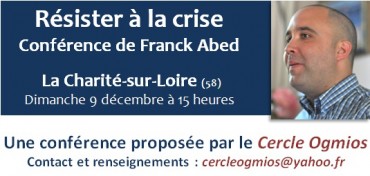



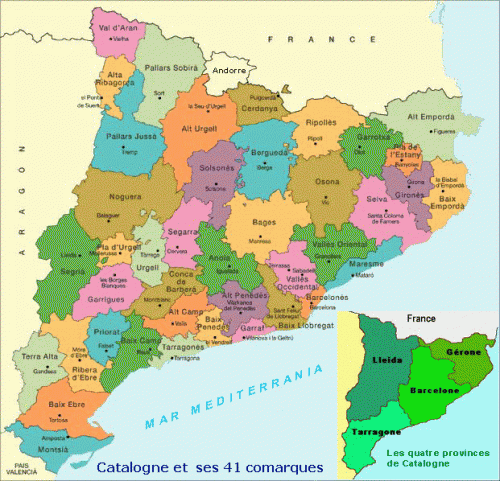
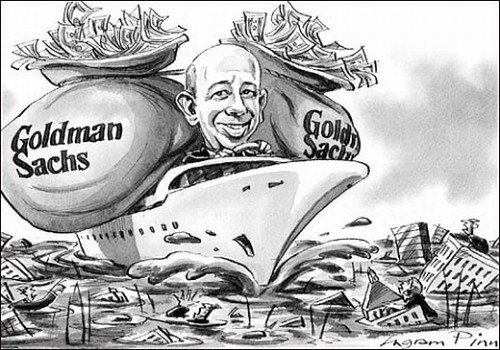

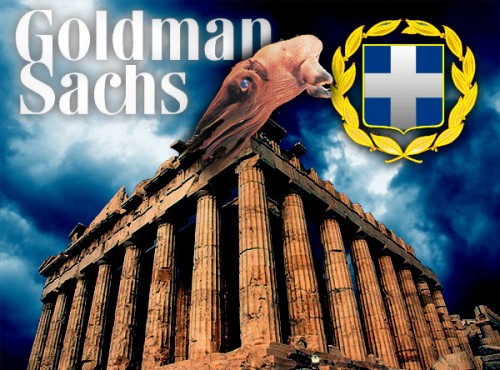
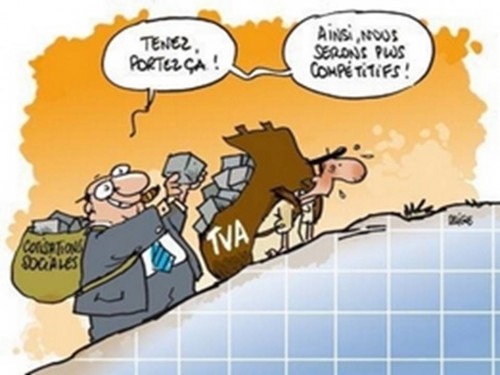
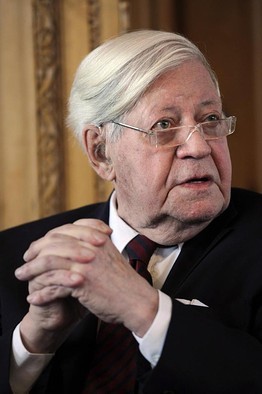 Le mercredi 7 novembre, lors du forum économique de l’hebdomadaire de Hambourg Die Zeit, l’ancien chancelier Helmut Schmidt a déclaré, devant 600 invités de l’économie et de la politique, qu’avec la crise de surendettement en arrière-plan, il n’est pas impensable qu’il y aura de profonds changements politiques et économiques. «Nous nous trouvons à la veille d’une possible révolution en Europe», prévient Schmidt. Il pressent que dans toute l’Europe la confiance dans les institutions européennes a diminué. La situation en Chine et aux Etats-Unis est également caractérisée par des incertitudes.
Le mercredi 7 novembre, lors du forum économique de l’hebdomadaire de Hambourg Die Zeit, l’ancien chancelier Helmut Schmidt a déclaré, devant 600 invités de l’économie et de la politique, qu’avec la crise de surendettement en arrière-plan, il n’est pas impensable qu’il y aura de profonds changements politiques et économiques. «Nous nous trouvons à la veille d’une possible révolution en Europe», prévient Schmidt. Il pressent que dans toute l’Europe la confiance dans les institutions européennes a diminué. La situation en Chine et aux Etats-Unis est également caractérisée par des incertitudes. 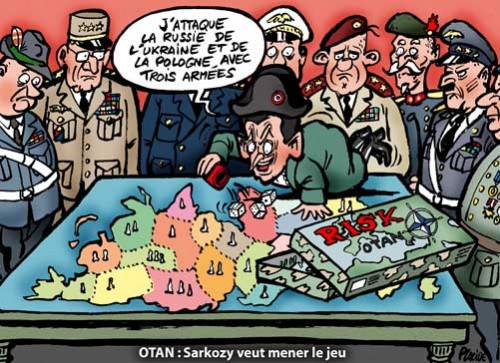
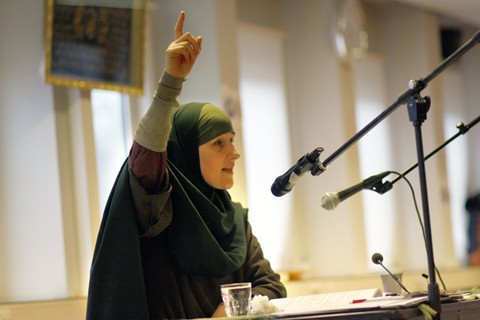




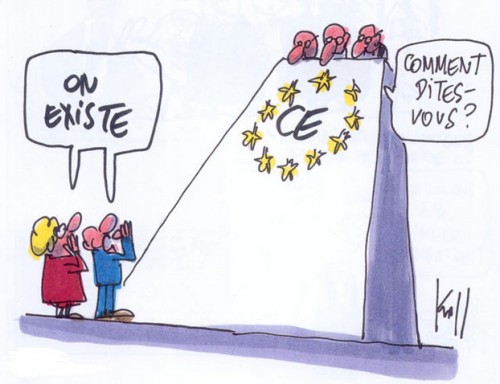
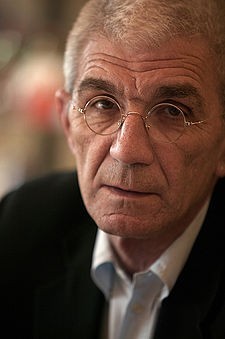


 “Vous avez un peuple et quasiment du jour au lendemain, à l’échelle des peuples, en une génération, vous avez à sa place, sur son territoire, un ou plusieurs autres peuples. Vous avez une culture, une civilisation et en moins de temps qu’il n’en faut à un enfant pour devenir adulte, à un jeune homme pour devenir un homme mûr, se développent sur le même territoire, par substitution, d’autres cultures, d’autres civilisations dont M. Guéant me permettra de dire qu’elles ne valent pas celle qu’elles remplacent, au moins pour prospérer sur ce territoire-là. Poitiers m’en soit témoin, voici que vous avez autour de vous d’autres monuments, d’autres édifices religieux, d’autres visages, d’autre relations entre les hommes et les femmes, d’autres façons de se vêtir, d’autres langues bien souvent et de plus en plus, une autre religion, d’autres nourritures et d’autres rapports à la nourriture, d’autres façons d’habiter la terre et plus encore d’habiter tout court, d’habiter les immeubles, les cages d’escalier, les quartiers, d’autres façons d’administrer l’espace, d’autres rapports à la nature, à l’environnement, à la loi, à la délinquance, à la violence, au contrat social, à la protection sociale, au pacte d’in-nocence, de non-nuisance.
“Vous avez un peuple et quasiment du jour au lendemain, à l’échelle des peuples, en une génération, vous avez à sa place, sur son territoire, un ou plusieurs autres peuples. Vous avez une culture, une civilisation et en moins de temps qu’il n’en faut à un enfant pour devenir adulte, à un jeune homme pour devenir un homme mûr, se développent sur le même territoire, par substitution, d’autres cultures, d’autres civilisations dont M. Guéant me permettra de dire qu’elles ne valent pas celle qu’elles remplacent, au moins pour prospérer sur ce territoire-là. Poitiers m’en soit témoin, voici que vous avez autour de vous d’autres monuments, d’autres édifices religieux, d’autres visages, d’autre relations entre les hommes et les femmes, d’autres façons de se vêtir, d’autres langues bien souvent et de plus en plus, une autre religion, d’autres nourritures et d’autres rapports à la nourriture, d’autres façons d’habiter la terre et plus encore d’habiter tout court, d’habiter les immeubles, les cages d’escalier, les quartiers, d’autres façons d’administrer l’espace, d’autres rapports à la nature, à l’environnement, à la loi, à la délinquance, à la violence, au contrat social, à la protection sociale, au pacte d’in-nocence, de non-nuisance. 